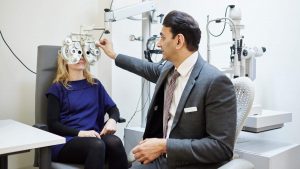Things to Consider When Having Laser Eye Surgery Over 50

In the early years of Laser Eye Surgery, prospective patients may have been found unsuitable for treatment for a number of reasons. Thankfully, as technology has developed and expertise has improved, more patients are suitable for the procedure than ever before.
But what about if you’ve reached a certain age and are beginning to experience the symptoms of presbyopia? In other words, what do you need to consider if you’re interested in having Laser Eye Surgery over the age of 50?
Laser Eye Surgery for Presbyopia
The reality is, if you and your eyes are healthy, you have a stable prescription, and you are not pregnant or breastfeeding, you will very likely be suitable for Laser Eye Surgery, whether you are over 50 or over 70. In fact, at London Vision Clinic, we are able to treat around 97% of the people we see – regardless of their age!
PRESBYOND® Laser Blended Vision
Patients who have reached a certain age may benefit from PRESBYOND® Laser Blended Vision, a unique treatment for presbyopia that can provide clear vision across all distances. It offers an effective solution to both hyperopia (long-sightedness) and myopia (short-sightedness) without the need for artificial lens implantation. For many patients, this can mean ditching the glasses and contact lenses for good.
While most patients are suitable for PRESBYOND® Laser Blended Vision (it is significantly more tolerable than monovision), a comprehensive screening process is required to know for sure. Furthermore, there are several other things to consider when having Laser Eye Surgery as an older patient.
For example, being over the age of 50 increases your risk of other ocular complications. Conditions such as glaucoma, cataracts, and dry eyes can affect your suitability for Laser Eye Surgery; however, in many cases, this isn’t the case. Let’s find out more.
Glaucoma
Glaucoma is the leading cause of blindness in the UK, with its prevalence increasing in older demographics. It is caused by a build-up of pressure in the eye (intraocular pressure), which leads to damage to the optic nerve. Over time, this can lead to irreversible vision loss, making timely diagnosis and treatment vital.
While Laser Eye Surgery is not a treatment for glaucoma, having the condition won’t necessarily make you unsuitable for treatment. When determining your suitability for Laser Eye Surgery, your surgeon should work in conjunction with your glaucoma specialist to ensure your glaucoma management will not be affected. At London Vision Clinic, our expert surgeons and consultation team will consider every case individually to determine the best course of action.
Cataracts
Cataracts are considered a natural part of the eyes’ ageing process. They are characterised by the gradual clouding of the eye’s natural lens, eventually resulting in visual impairment. In some cases, cataracts may be linked to other medical conditions; however, they are generally treatable with routine Cataract Surgery.
This straightforward treatment (which is also available at London Vision Clinic) involves replacing the eye’s natural lens with an artificial intraocular lens (IOL) through a procedure known as refractive lens exchange or clear lens exchange.
The NHS performs Most Cataract Surgeries; however, these treatments use standard IOLs that do not accommodate existing refractive errors. As a result, many patients will still rely on glasses or contact lenses after their treatment. In contrast, private Cataract Surgery uses specialist IOLs to address refractive errors such as myopia, hyperopia, astigmatism, and presbyopia.
Dry Eyes
Dry eyes is a common ocular complaint, especially as we get older. Many people may experience dry eye symptoms from time to time with no significant effects on their life or eye health. However, in some cases, dry eyes can be linked to a more serious condition and may affect a person’s suitability for Laser Eye Surgery.
In the past, dry eyes were often considered a contraindication for Laser Eye Surgery. However, this is no longer the case for many patients.
Thanks to the introduction of ReLEx SMILE, a keyhole technique that reduces the invasiveness of the procedure, many patients with dry eyes are now suitable for Laser Eye Surgery. In addition to improving recovery times, this innovative treatment also significantly reduces the risk and severity of post-surgery dry eye, making treatment an option to more people than ever before.
Find out if you could be suitable for Laser Eye Surgery
If you are over 50 and have any concerns about an eye condition that you think may make you unsuitable for Laser Eye Surgery, get in touch with one of our friendly clinic coordinators or Book a Consultation today to find out more.


